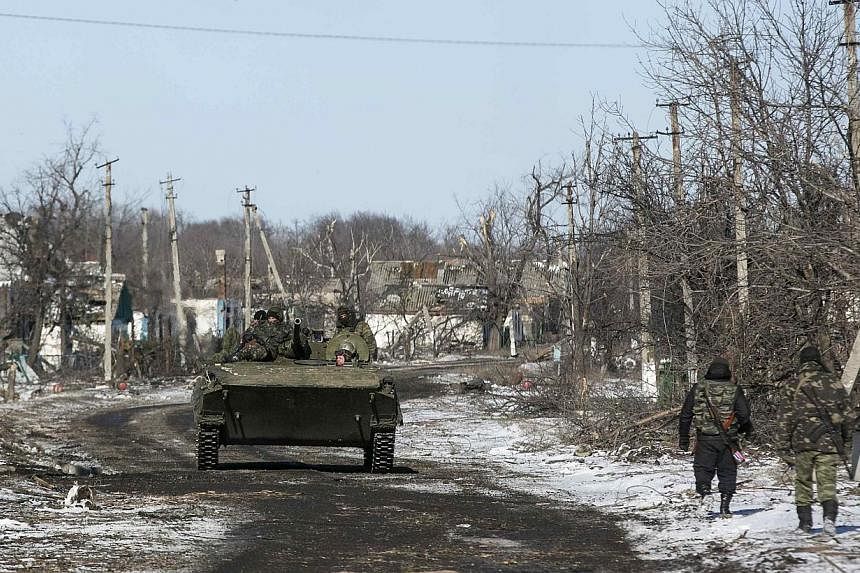OTTAWA (AFP) - Canada announced on Tuesday new sanctions against Moscow and its sympathisers, including the state oil giant Rosneft, as pro-Russian separatists defied a ceasefire and stormed a flashpoint town in eastern Ukraine.
Two months after sanctions took aim at Russian interests in its vital oil and gas sectors, Canada targeted a flagship of the Russian economy in Rosneft.
The new economic sanctions and travel bans target 37 Russian and Ukrainian individuals, as well as economic sanctions against 17 Russian and Ukrainian entities, including Rosneft. "Our Government remains steadfast in its commitment to stand with the people of Ukraine in the face of the Putin regime's ongoing military aggression, which has already cost the lives of more than 5,300 people," Canadian Prime Minister Stephen Harper said. "Canada's position remains clear: we recognize the sovereignty and territorial integrity of Ukraine and will never recognize the illegal Russian occupation of any part of the country."
"The collective sanctions imposed to date by Canada and its partners are putting real economic pressure on the Putin regime and its collaborators," Mr Harper added. "The cost to Russia will continue to rise if it persists in its escalation of the conflict and refuses to allow a peaceful resolution."
The move was made in coordination with the European Union and the United States, which have also punished Moscow for what they say is its military backing of the separatists in eastern Ukraine.
Russian President Vladimir Putin rejects the accusation and describes the Russian fighters seen in Ukraine as "volunteers".
Ukraine early on Tuesday appealed to the West to get "tough" on Moscow after separatists attacked Debaltseve, a transport hub, in violation of the three-day-old ceasefire.
The UN and Western powers called for an immediate end to hostilities in eastern Ukraine as fierce fighting around the town of Debaltseve threatened the latest attempt to end the bloody 10-month conflict.
The US condemned the violence, which it blamed on "separatist forces acting in concert with Russian forces", and warned Moscow it would face penalties for supporting the rebel fighters encircling the strategic transport hub.
But Mr Putin - who denies backing Ukraine's insurgency - said the conflict, which has killed more than 5,600 people, could not be solved by "military means" and urged Kiev's troops to surrender.
"I hope that the Ukrainian authorities are not going to prevent the Ukrainian soldiers from laying down their weapons," Mr Putin said in a press conference during a visit to Budapest.
Ukrainian President Petro Poroshenko, in a phone conversation with German Chancellor Angela Merkel, said the assault on Debaltseve was a "cynical attack" on the truce brokered last week by Germany and France.
He called for the European Union and international community to take a "tough reaction against the treacherous actions of the rebels and Russia".
Kiev and pro-Russian rebels agreed on a peace roadmap on Feb 12 after marathon negotiations in Minsk involving the leaders of France, Germany, Russia and Ukraine.
But the insurgents have argued that Debaltseve, which sits on a railway line linking rebel-held Donetsk and Luhansk, is well inside their territory behind the frontline so should not be included in the ceasefire agreement, while Kiev says it controls the territory.
The UN Security Council on Tuesday "called on all parties to immediately cease hostilities" and allow peace monitors to enter the town.
US Vice-President Joe Biden "strongly condemned" the violence and warned the "costs to Russia will rise" if it "continues to violate the Minsk agreements, including the most recent agreement signed on Feb 12".
Intense shelling was heard in the Debaltseve area on Tuesday, AFP journalists reported from the neighbouring town of Soledar.
Ukrainian officials admitted that pro-Russian rebels had taken parts of the town and surrounded some of the army units there, but said fierce fighting was continuing.
"The hopes of the world for peace are being destroyed," the deputy head of Ukraine's presidential administration Valeriy Chaly said.
The rebels, who claimed to control 80 per cent of Debaltseve, said they have killed "many" of the 8,000 soldiers they said were holed up in the town and taken dozens more prisoner.
An estimated 5,000 civilians were also cowering in cellars, with little water or food.
It was not known how many casualties the street-to-street combat by fighters armed with automatic weapons and grenade launchers had caused.
Journalists and observers from the Organization for Security and Cooperation in Europe (OSCE) have been stopped by rebels from entering the town.
The insurgents had waged an intense bombardment of the town last Saturday, the day before the ceasefire came into effect, and kept up rocket and mortar fire afterwards.
That violence, and other breaches of the truce both sides blamed on the other, prevented the warring forces from pulling back heavy weapons from the frontline in Ukraine's east as was meant to happen from Tuesday.
Russia has been hit by several rounds of Western sanctions over its perceived role in the conflict.
US President Barack Obama has said arming Ukraine against the rebels was one option he could consider if things got worse, although he would prefer to pressure Russia through other means.
The violence in Debaltseve has unsettled world powers and agencies after several failed attempts to broker a lasting ceasefire.
EU foreign policy chief Federica Mogherini said that "we knew from the beginning that it (the truce) was going to be difficult, fragile", but the Russians and separatists know that "it's all the international community looking for the implementation of these agreements".

